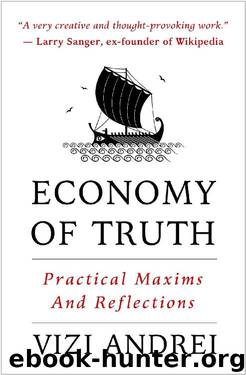Economy of Truth: Practical Maxims and Reflections by Vizi Andrei

Author:Vizi Andrei [Andrei, Vizi]
Language: eng
Format: epub
Published: 2018-08-31T23:00:00+00:00
Chapter VI
An Artist Among Robots
Chapter VI
An Artist Among Robots
The battery for creativity is a diamond placed somewhere deep under the sea.
Struggle to find it, and you’ll trouble the water. It will get blurry – you won’t be able to see anything.
Swim patiently, and the water will become calm and clear. You’ll see the diamond shining before you know it.
*
I produce my best ideas spontaneously, when I don’t try to get much done: when lying in bed, taking a shower, after a workout or during a long walk in the park.
Yet, I finish my projects only actively: forcing myself to focus and generate deep, uninterrupted work.
In other words, creative work represents a contract between my subconscious mind and my conscious one – and I’m the lawyer who has to close the deal.
*
An artist is someone who favors beauty over efficiency, imagination over logic, curiosity over obedience, and, above all, action over thought.
*
The road to job security is paved with quicksand. It seems to be safe and smooth on the surface, but the risks are hidden under the road.
In your career, you don’t want to choose any road, but to find your own way through the wild. Here’s where the strongest species like to hang out; here’s where the most stunning plants want to grow.
*
A: What do you do for a living?
B: I write.
A: So, you're a writer!
B: No.
A: But you've just said you write – so you're thus a writer, correct?
B: Well, I do write, yes, but I am not a writer.
A: I'm confused, what do you mean?
[...]
You're not a lawyer. You're someone who helps people deal with legal matters. You're not a doctor. You're someone who saves people's lives or gives them the right advice to improve their health.
Add a verb to your identity – it keeps you sane; not a pompous noun – which may only boost your ego; it may distract you from your purpose, from the actions you need to regularly take.
Your job is to do something, not to be something.
*
A good writer chooses his words carefully.
A great writer lets the words choose him.
*
Your “life calling” emerges as a result of trial and error rather than predetermined desire or choice.
*
I write because, well, that’s what I do – not because that’s what I want to do. There’s no desire, no willingness – but rather a natural necessity.
*
Quite often, my mind doesn’t get tired, but bored. I usually lie to myself by taking breaks, to apparently get “some rest” – however, they are not breaks, but engagements in other activities that do not bore me anymore.
Some call this “procrastination” – and many well-intentioned figures demonize it; they tell us to stop procrastinating for keeps.
Procrastination may often be harmful, but, if practiced and understood well, it may also be the gateway to truly creative work.
More than half of this book is not the result of discipline or motivation, but of procrastination. I was quick to start, yet very slow to finish – in this way, I allowed my mind enough time and energy to ruminate and become creative.
Download
This site does not store any files on its server. We only index and link to content provided by other sites. Please contact the content providers to delete copyright contents if any and email us, we'll remove relevant links or contents immediately.
| Acupuncture & Acupressure | Aromatherapy |
| Ayurveda | Chelation |
| Chinese Medicine | Energy Healing |
| Healing | Herbal Remedies |
| Holistic | Homeopathy |
| Hypnotherapy | Massage |
| Meditation | Naturopathy |
| Reference |
Inner Engineering: A Yogi's Guide to Joy by Sadhguru(6796)
The Power of Now: A Guide to Spiritual Enlightenment by Eckhart Tolle(5782)
Fear by Osho(4740)
Ikigai by Héctor García & Francesc Miralles(4274)
The Art of Happiness by The Dalai Lama(4130)
The Ultimate Bodybuilding Cookbook by Kendall Lou Schmidt(3945)
Yoga Therapy by Mark Stephens(3749)
The Little Book of Hygge by Meik Wiking(3694)
The Healing Self by Deepak Chopra(3580)
Why Buddhism is True by Robert Wright(3454)
The Hatha Yoga Pradipika (Translated) by Svatmarama(3342)
Being Aware of Being Aware by Rupert Spira(3276)
Shift into Freedom by Loch Kelly(3199)
Wild Words from Wild Women by Stephens Autumn(3153)
Work Clean by Dan Charnas(3123)
Happiness by Matthieu Ricard(3050)
More Language of Letting Go: 366 New Daily Meditations by Melody Beattie(3030)
Yoga Body & Mind Handbook by Jasmine Tarkeshi(2880)
Why I Am Not a Feminist by Jessa Crispin(2760)
